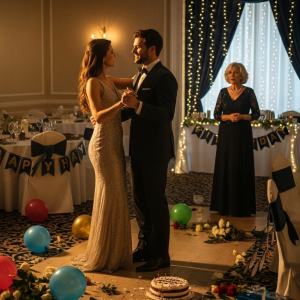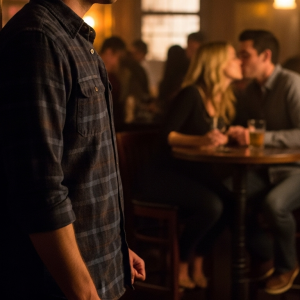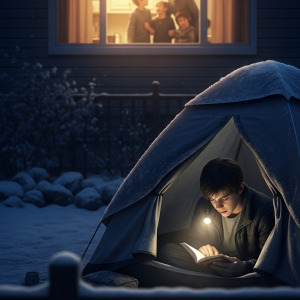I’m thirty-three now, with a good job in upper management and a life I built from nothing. But sometimes, in the quiet moments, I still feel the echo of the boy I was at sixteen—the boy my mother decided she no longer had room for.
She had me at twenty. My biological father was a ghost; she told him he could stay, and he bolted. No fights, no child support. Just an absence. For the first eight years, it was just us, living in a tiny apartment above my grandparents’ garage. They were her lifeline, helping her finish her physical therapy degree while raising me. I’ll give her credit: she was a single mom who worked hard. Money was tight, but I never felt it. My world was small and safe, filled with time with my grandparents and bedtime stories from a tired but present mother.
Things changed when I was eight. She met a man named Leonard. He was stable, polite, and completely different from the men she’d dated before. They married when I was eleven. Leonard wasn’t cruel to me, but he wasn’t warm, either. He treated me with a distant civility, like a piece of furniture that came with the house.
Slowly, the dynamics of our home began to shift. My mother’s focus pivoted entirely to Leonard and their new life. I’d try to join their dinner conversations, to tell them about a good grade or a funny story from school, but their talk was a closed loop. My words would just hang in the air for a moment before Leonard changed the subject back to their work or their weekend plans. I was being gently, methodically, pushed to the margins.
When I was twelve, she became pregnant with twins. I was genuinely excited. I imagined being the cool older brother, part of a real, bustling family. But as her pregnancy progressed, it was like a switch flipped. Her attention, already divided, now bypassed me completely. Everything was about the coming babies. I told myself it was temporary. I was wrong.
Once the twins were born, I became invisible overnight. It wasn’t just that she was busy; it felt like she had fundamentally stopped seeing me. The little connections that had held us together—talking about our day, watching a show, sharing an inside joke—all vanished. I tried harder, working my tail off in school and helping around the house, desperate for any sign that I was still worth noticing. It didn’t matter.
By the time I was sixteen, the pretense was over. My mother and Leonard called me into the living room for a “serious conversation.” Leonard did most of the talking, laying out their financial difficulties with the twins, the rising expenses. My mom just sat there, her face unreadable. Then she delivered the line I’ll never forget, the words that severed the final thread.
She looked at me, not with sadness, but with a cold finality. “They deserve more.”
Not, “we’ll figure it out.” Not, “we’re in this together.” Just a clear, brutal statement of my new place in the world: I was in the way.
I didn’t argue. What was the point? I went to my room, packed a single bag, and walked out the door. I went straight to my grandparents’ house. They took me in without hesitation, my grandpa pacing and muttering about his own daughter’s heartlessness while my grandma held me tight. That was the day I learned I was on my own.
Living with my grandparents gave me a roof over my head, but they were retired and on a fixed income. I knew I couldn’t be a burden, so I got a job at a local coffee shop. My life became a frantic balancing act of early morning classes and late-night shifts. My grades slipped, but I was determined to graduate.
Throughout it all, my mother’s silence was absolute. It was as if I had never existed. Through family gossip, I’d hear about her perfect life: the twins were thriving, they’d bought a new car, they were planning a vacation. I couldn’t understand how two people with decent jobs couldn’t afford a third, low-maintenance child. I eventually realized it was never about the money. It was about desire. They simply didn’t want me.
When college acceptance letters arrived, a wave of excitement and terror washed over me. I had no way to pay for it. Against my better judgment, I sent my mom a text. I rewrote it a dozen times before finally sending:
“Hey, I’ve been accepted to a few colleges. I was wondering if you could help with financial aid stuff or co-sign a loan.”
The screen lit up hours later. For a split second, a stupid, stubborn hope flickered in my chest. Then I read the words.
“We’re saving for the twins’ future. We can’t help. Sorry.”
That was it. Not “congratulations.” Not “we’re proud of you.” Just a closed door. It wasn’t the rejection that hurt most; it was the complete and utter lack of care.
Thankfully, my aunt stepped in. When I told her what happened, she didn’t hesitate. “I’ll co-sign your loans,” she said, looking me straight in the eye. “You just focus on making this work.” It wasn’t the money that broke me; it was the belief. Someone still believed in me.
That moment forged a promise in me: I would not fail. I worked relentlessly through college. My life became a blur of campus jobs, freelance web design gigs, and weekend shifts. Sleep was a luxury. All the while, my mother’s social media was a gallery of the life I wasn’t a part of—birthdays, school plays, a trip to Disneyland. Each smiling photo was a fresh stab. I finally blocked her. I had to.
When I graduated, my aunt was in the front row, cheering louder than anyone. I didn’t even send my mother an invitation. She hadn’t invested in my struggle, so she had no right to celebrate my success.
After graduation, the grind continued. I moved for a job, lived in a tiny apartment, and poured every ounce of my energy into my career. I took on extra projects, stayed late, and learned everything I could. Slowly, promotions came. By my late twenties, I was finally financially stable. By thirty, I was in upper management, making more money than I’d ever imagined.
I kept my success quiet. I knew it would only attract the wrong kind of attention. But my aunt, my rock, knew everything. Proud of me, she let it slip to my mother at a family gathering, hoping, I think, for some kind of reconciliation. It did the opposite.
A few days later, there was a knock on my door. It was my mother and Leonard. I hadn’t seen them in nearly a decade. I opened the door but blocked the entrance. “What do you want?” Leonard, ever the charmer, didn’t bother with pleasantries. He pushed past me into my home. “We need to talk. We heard about your promotion. About time you made something of yourself.”
My mother jumped in, her voice void of any warmth. “The twins are starting college soon, and things are tight. We figured since you’re doing so well, you could help with their tuition.”
The sheer audacity left me speechless. After years of radio silence, they show up not with an apology, but with a demand. “Are you serious?” I finally managed. “Why wouldn’t we be?” Leonard shot back. “You’ve got the money. You don’t have a family or kids to support. It’s the least you can do.” “It’s not about the money,” I said, my voice rising. “It’s about the fact you did nothing for me, and now you’re here with your hand out, acting like I owe you something.” My mother rolled her eyes. “Oh, here we go. The victim. You turned out fine, didn’t you? Stop holding a grudge.” “I turned out fine in spite of you, not because of you,” I snapped. Leonard smirked. “Maybe you should be thanking us. If we hadn’t pushed you out, you wouldn’t be where you are today.”
That’s when the rage I’d suppressed for years finally boiled over. “Thanking you? You threw me out because I was an inconvenience! You made it clear I didn’t matter. And now you expect me to fund the lives of the children you actually wanted? Absolutely not.” My mother’s face turned to ice. “You’re being selfish. I sacrificed everything for you when you were little! And this is the thanks I get? They are your siblings! You owe them this!” “I don’t owe them, or you, a single thing,” I shot back. “You made your choice a long time ago. This isn’t my problem.” “We’re still your family,” Leonard snarled, stepping toward me. “No,” I said, my voice cold and firm. “Family doesn’t do what you did. You’re just strangers who share my DNA. Now get out of my house.” Her face twisted with fury. “You’ll regret this,” she hissed as they left. As the door clicked shut behind them, I knew with absolute certainty that I wouldn’t.
I thought that would be the end of it. I was wrong. A few weeks later, my mother showed up at my office while I was out sick. She caused such a scene, shouting about how I owed her, that security had to escort her out. I was mortified.
The worst was yet to come. A week later, I came home from work to find her waiting for me, pacing my driveway like a caged animal. The moment I got out of my car, she was on me. “You can’t keep ignoring me!” she screamed. “You think you can just walk away from your responsibilities?” “The twins are your responsibility!” I shot back, keeping my distance. That set her off. She launched into a tirade about how ungrateful and selfish I was. Her voice grew louder, more hysterical, attracting the attention of my neighbors, who began to emerge from their homes. “He’s a monster!” she shrieked, gesturing wildly at me. “He doesn’t care about anyone but himself!”
Her eyes were wild. She lunged, trying to grab me. “After everything I’ve done for you!” “Stay back!” I warned, pulling out my phone and dialing 911. “I mean it, stay back!” She made a frantic grab for my phone, screaming, “Don’t you dare call the police on your own mother!” “You abandoned me!” I yelled back, holding the phone out of her reach. “You threw me away like I was nothing!” The chaos escalated until a neighbor finally stepped in and pulled her away, just as the wail of sirens filled the air. As the flashing lights washed over her contorted face, I realized this wasn’t my mother anymore. This was a stranger fueled by rage and entitlement. I knew then that I had to protect myself, permanently.
The next day, I filed for a restraining order. When I told my grandparents, they were heartbroken but resolute. “This is the last straw,” my grandpa said, his voice heavy. “We’re cutting ties.”
The order was granted. And for the first time in a long time, there was quiet.
Months passed. Life settled into a new, peaceful normal. I focused on my work, my home, and the family I had chosen: my grandparents, my friends, and especially my aunt. To thank her—not to repay her, but to show her what her faith meant to me—I sent her and her family on the weekend getaway she’d always dreamed of but never allowed herself. Her tearful gratitude was more fulfilling than any professional success.
I thought the door to my past was sealed shut. Then, one day, I received a text from an unknown number. “Hey, it’s Max. Can we talk?”
Max. One of the twins. My half-brother. I stared at the message, suspicion warring with a curiosity I hadn’t expected. I eventually agreed to a phone call. “Hey,” he said, his voice nervous. “I know this is random. But I know what my parents did to you. I didn’t understand it when I was a kid, but I do now. It was horrible, and I don’t blame you for walking away.”
His honesty was disarming. He continued, “But I hate that their choices kept us from having a relationship. That’s on them, not you. I’d like to get to know you, if you’re open to it. I’m not asking you to forgive them. I just want to know my brother.”
For years, I’d seen the twins as symbols of my replacement. But hearing Max’s voice, I realized they were just kids caught in the wreckage of our parents’ selfishness. They didn’t choose this any more than I did. “Why now?” I asked. “Because I don’t want us to be strangers forever,” he said simply.
I’m still cautious. I’ve built strong walls to protect the life I fought for. But Max’s words felt genuine. He wasn’t asking for money or making excuses; he was just asking for a connection. “Alright,” I said, the word feeling bigger than it sounded. “We can start with a conversation.”
I don’t know where this will lead. But for the first time, it feels like a bridge is being built over the ruins of my past. It’s a small step, but it’s a step forward. And for now, that’s enough.
Max and I started talking regularly. No big promises, no sweeping declarations. Just two strangers connected by blood, cautiously trying to build something from the wreckage.
He told me about his life — the pressure of being “the golden child,” the silent expectations, the feeling of being loved with conditions. “I used to think you were selfish,” he admitted during one of our late-night calls. “Mom always said you left because you didn’t want to share. I believed her.”
I let out a dry laugh. “She’s good at rewriting the story.”
“She is,” Max said quietly. “But I see it now. She wasn’t the mother I thought she was. Not to you. And honestly… not to us either.”
That caught me off guard. “What do you mean?”
“She controls everything. Who I see, what I study, who I date. She wants us to live the life she chose, not the life we want.”
“Sounds familiar,” I muttered. “Welcome to the club.”
He chuckled bitterly. “I think… talking to you is the first time I’ve felt like someone actually understands.”
I didn’t know what to say. I wasn’t used to being seen, let alone understood. But his words stuck with me.
Weeks later, Max asked if we could meet in person. I said yes. Cautiously, but yes.
We met at a quiet coffee shop halfway between our homes. When I arrived, Max was already there, fiddling with a cold cup of tea. He stood up quickly when he saw me.
“Hey,” he said, nervous.
“Hey,” I replied. “Get me a black coffee?”
He nodded and went to the counter. When he came back, we talked. For over an hour. About nothing and everything. His dreams. My regrets. And then, quietly, he said:
“I want you to meet someone. My boyfriend, Nate.”
I raised an eyebrow. “Does Leonard know?”
“He hates it. So does Mom.” He looked away. “She said being gay was a phase. Blamed it on the internet… and you.”
I blinked. “Me?”
“She said you were a bad influence. That your absence made me weak.”
I almost laughed. “Amazing. I don’t exist when they need to ignore me, and I’m a scapegoat when they need to blame someone.”
Max looked at me seriously. “But I don’t believe her anymore. I want you in my life. Not as a symbol, not as a grudge—just as my brother.”
I nodded slowly. “Alright. But no fantasy reunions. This’ll take time.”
“That’s all I’m asking,” he said, and smiled.
Things were going well. I let my guard down. I thought maybe—just maybe—we were building something real.
Then came the call.
“Are you the son of Eleanor?” asked an unfamiliar voice.
“Depends who’s asking,” I replied, guarded.
“I’m her attorney. She’s had a massive stroke. Hospital asked for next of kin.”
Time stopped.
I didn’t know what I felt. Anger? Sadness? Nothing? I texted Max.
He answered instantly. “She’s in critical condition. Leonard’s still out of the country. I’m here. They’re asking for family decisions. I… I don’t know what to do.”
“Do you want me to come?”
He hesitated. “I do. Not for her. For me.”
So I went. Not for her — for Max.
Standing in that hospital, I was flooded with memories. Being sixteen. The living room talk. The cold couch. The single bag. The door that closed behind me. I looked at the woman behind the glass — fragile, silent, dependent — and I didn’t see my mother. I saw a stranger in the shape of someone who once tucked me into bed.
“She doesn’t look so powerful now,” Max whispered.
“She never was,” I said quietly. “She just made us believe she was.”
“Do you hate her?”
I thought about it. “I don’t know if I do. I think I stopped needing her a long time ago. That’s worse than hate.”
Max looked down. “Do you think… if she wakes up, you’ll forgive her?”
“I didn’t come here to forgive,” I said. “I came to finish this chapter.”
She didn’t wake up. Not then. Not ever.
Leonard flew back and arranged a funeral. It was cold, clinical. Max cried. I didn’t. I stood by him, though, and when he broke down, I was the one who held him.
After the service, Leonard approached me outside.
“You win,” he said bitterly.
“This wasn’t a contest.”
“You always played the victim.”
“Because I was,” I said sharply.
“She regretted it, you know. What she did to you.”
“Too bad she never told me that herself.”
Leonard shrugged. “She was stubborn. Like you.”
I met his gaze. “I didn’t come for her. I came for Max.”
He sighed. “I suppose that’s something.”
“No,” I said. “That’s everything.”
A few months later, I invited Max and Nate on a weekend hike. Just the three of us. No drama, no past. Just open skies and conversation.
At the top of the ridge, overlooking the valley, Max turned to me.
“You know,” he said, “when I was a kid, I used to imagine what it would be like to meet you. I had this fantasy of asking, ‘Would you want me as your little brother?’”
I smiled. “And now?”
He smiled back. “Now I don’t need to ask.”
I wrapped an arm around his shoulder. “Good. Because you are.”




